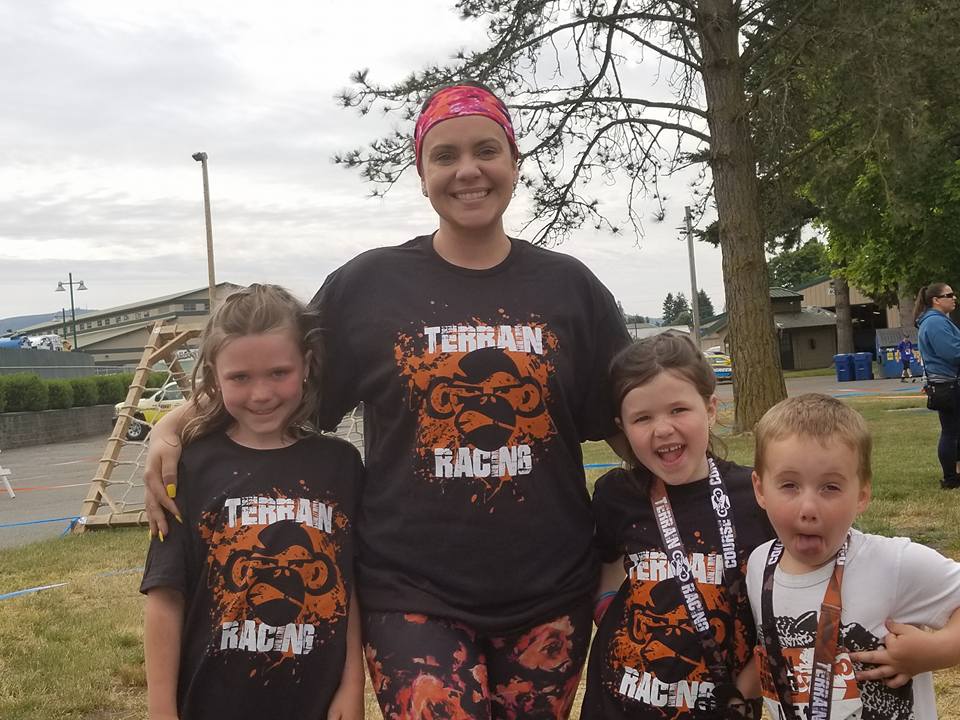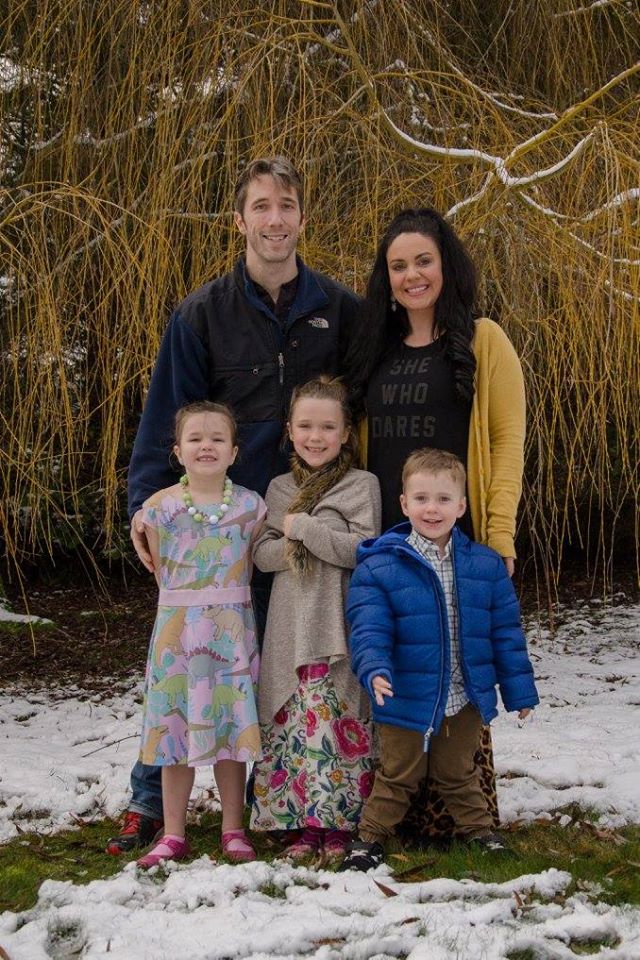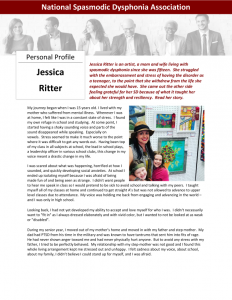Jessica Ritter finds that talking to others helped her overcome her fears
Jessica Ritter is an artist, a mom and wife who has been living with spasmodic dysphonia since she was fifteen. She struggled with the embarrassment and stress of having the disorder as a teenager, to the point that she withdrew from the life she expected she would have. She came out the other side feeling grateful for her SD because of what it taught her about her strength and resiliency.

My journey began when I was 15 years old. I lived with my mother who suffered from mental illness. Whenever I was at home, I felt like I was in a constant state of stress. I found my own refuge in school and studying. At some point, I started having a shaky sounding voice and parts of the voice disappeared while speaking. Especially on vowels. Stress seemed to make it much worse to the point where it was difficult to get any words out. Having been top of my class in all subjects at school, the lead in school plays, and a leadership officer in various school clubs, this change in my voice meant a drastic change in my life.
I was scared about what was happening, horrified at how I sounded, and quickly developing social anxieties. At school I ended up isolating myself because I was afraid of being made fun of and being seen as strange. I didn’t want people to hear me speak in class so I would pretend to be sick to avoid school and talking with my peers. I taught myself all of my classes at home and continued to get straight A’s but was not allowed to advance to upper level classes due to attendance. My voice was holding me back from engaging and advancing in the world – and I was only in high school.
Looking back, I had not yet developed my ability to accept and love myself for who I was. I didn’t necessarily want to “fit in” as I always dressed elaborately and with vivid color, but I wanted to not be looked at as weak or “disabled”.
During my senior year, I moved out of my mother’s home and moved in with my father and step-mother. My dad had post-traumatic stress syndrome (PTSD) from his time in the military and was known to have tantrums that sent him into fits of rage. He had never shown anger toward me and had never physically hurt anyone. But to avoid any stress with my father, I tried to be perfectly behaved. My relationship with my step-mother was not good and I found this whole living arrangement kept me stressed out and unhappy. I felt sadness about my voice, about school, and about my family; I didn’t believe I could stand up for myself, and I was afraid.
In short, I felt weak and I couldn’t speak.
To stay out of the house as much as possible, I started full-time college classes while still in high school. I also decided to get a job. I went out pounding the pavement, searching for a job, but every single establishment turned me down. I felt like I was seemingly unhireable. I even started trying less desirable jobs in hopes they would hire me despite my voice. No luck.

“My voice is what helped me to find my passion, to find my compassion, to find my wholeness of love in both myself and everyone I meet. I see the complete picture.”
I remember vividly walking into a video rental business and telling the person at the front desk I was here for an interview. He took me to the back to meet with the manager. I was feeling nervous, as many do during an interview, but not overwhelmingly so. He asked me a question. I answered. Then, he said something I would never forget.
“What is wrong with you? You need to calm way down. Are you having a nervous breakdown or something? Just sit and breathe. In and out. Are you going to be ok?” I wanted to say I have a voice disorder, and I am just fine. But I just couldn’t bring myself to say it. So, I left, and never heard from him again.
I felt broken and I had lost hope.
I thought that if no one would hire me because of my voice, then I was going to go nowhere in life despite my intelligent mind and drive. I forced myself to go to the last interview I had scheduled. It was at a bagel shop that I had been going to for as long as I could remember. I stood in front of the doors just terrified, prepping myself for another rejection. I somehow knew that this was going to be the determining factor on whether or not I just gave up trying.
I walked in, sat down at the table across from the owner Ken, and said “Hi my name is Jessica and I have a speech disorder.” There was a long pause, as he just looked at me. Finally, he smiled and said “You are hired, Jessica.”
And that was a turning point in my life. If a stranger could believe in me enough to hire me at a job that involved talking to customers all day
long, I could believe in myself to be able to do it. I found the more that I talked to people, the easier it became. My voice hadn’t changed. I still had to repeat myself to most customers over and over again. I had to explain that I wasn’t sick and didn’t have a cold and that the quality of my voice was permanent. But something inside me had changed.
The “Bagelry” was always a melting pot of people. Everyone sat together in the open, enjoying their bagels just inches away from one another. It was truly a place that fostered originality and culture and art and togetherness. There was a place there for everyone. When I left for college, I’ll never forget when Ken told me, that whenever I came back, if I ever needed a job, he would always have one for me. He always made me feel accepted even with my voice disorder. He helped create a place I felt safe and understood, like a home. It was truly glorious. I knew that although it was significantly harder to make my way in the world, it was still possible to be a success.
It was time to venture out on my own.
I moved from my small town to the expansive University of Washington campus. Even though I was excited for this new phase in my life, all of the anxiety about my voice came flooding back. I forgot all I had learned about community and that talking to others actually helped me to overcome my fears.
I was assigned to a dorm with seven other girls. They were different than me. They wanted to do all of the wild things that college kids do, and I wanted to stay home and read and avoid talking to anyone. Some of them found it funny to make me feel uncomfortable, so I withdrew more. Because I didn’t have a safe space to come home to after classes, I found my safe time was when the girls were in class. So, I started skipping classes. I retreated from mean girls, retreated from the fear of being called on in class, retreated from the awful student group projects.

My grades started to fall. I was passing, but I was embarrassed that I was just passing. That wasn’t me, I was a high achiever, I was the driven passionate academic. I wasn’t this mess hiding in her dorm room every day just to avoid any human contact. So, I looked for a roommate and I moved out. I thought it was better to get a male roomie because I figured there would be no more “mean girls” in my life.
Over time, my friendship with my roommate blossomed into something more. I am married to that roommate for 14 years now. He has been a big part of me discovering who I am and helping me to find my voice.
One day my husband and I were having a conversation and I told him that I love him despite his flaws. He said he loves me because of my flaws. He said that he loves all the things that make me different – that those differences make me beautiful. He allows me to follow my dreams and to be myself. He doesn’t mean to, it is just his nature, but he also keeps me from worrying about my voice. He thinks my voice is perfect and my laugh is even better. When we go to functions where I may be nervous to talk to new people he says I will be just fine. That is exactly what I need. Someone who tells me that I’m going to be just fine. The people won’t bite me if my voice shakes. They won’t run afraid in the other direction. It is just a conversation. I learned through years of being with someone who embraces all of me, to finally embrace all of myself.
At the age of 30, I went back to my general practitioner about my voice. He sent me to an ENT in Silverdale WA. He told me immediately that I very clearly had spasmodic dysphonia. I was happy to finally have a word for what my voice was doing. I have tried no treatments because I have other issues that would make Botox™ and surgery impossible.
A few things happened as I got older.
I learned how to forgive. I authentically forgave my parents. Then I turned to myself. It wasn’t logical not to extend that realization to myself. I had my deck of cards. My speech disorder was certainly my least favorite one, but it wasn’t going anywhere, it was always going to be there, so I had to learn to play my deck to win…I began to embrace who I was. The good, the bad, the ugly voice disorder. The way that I deal with my SD now is a very natural process. I attack it with kindness and connection. My voice is significantly worse when stressed. So I eliminate the stress. Reduce the difficulty is now my motto. I do this by practicing yoga, painting art that has a purpose and a mission to inspire people at my business The Suave Sparrow, and forcing myself to talk to everyone I see. I was really “forcing” myself when I began.
Now, it is more of a habit and I have seen great benefits. I used to go all about town running errands and never talking to a single soul. In the checkout lane I would sit there waiting painfully in silence for the clerk to check out each item. It would eat me up inside… turning my voice into a stuttered choking thing. Then, I realized that if I just went straight to talking to people, all people, I would have nothing to be anxious about. So I did, and I do. When I have bad voice days I still may have to force myself to talk to people, but for the most part I have decreased my spasms significantly by accepting and loving myself, surrounding myself with good people, and connecting and inspiring my community.
Then I did something REALLY crazy.
I became thankful for my disorder. That bares the importance of reading twice. I became THANKFUL for my disorder. Through this disorder I learned to understand others who are struggling and to know that everyone is struggling with something. We all struggle, but beauty is born when we embrace those struggles and use them to create beauty.
Which brings me to the place where I am now. Thirty-three years old, married 14 years, mother of 3 children (who adore the sound of their mother singing and reading to them), and an artist. Art allows me to express myself without my voice. It allows me to paint the world that I see, beyond what is, beyond our daily struggles, beyond the black to a world full of possibilities and color. My voice is what helped me to find my passion, to find my compassion, to find my wholeness of love in both myself and everyone I meet. I see the complete picture. I see the picture that is hidden for so many.
That is why I decided to create T-shirts for people with spasmodic dysphonia like myself. I want the world to know we have a voice, to know our story. I want people with SD to be able to share their story even if they are not ready to speak it aloud. A shirt allows them to explain to the world even on bad voice days the reason why their voice is different. It also creates community and togetherness for those who feel they are walking the path alone. I want them to know they are not alone, they are just unique. We are all in this together. A T-shirt is like a big hug sent from my heart to theirs that they can wear whenever they need one.

For the past 10 years I have been a stay-at-home mom but my last fledgling will be leaving the nest for kindergarten soon. I’m anxious about entering the workforce in a small town. I am limited in my options and with spasmodic dysphonia I feel even more limited. I am thankful to know that my SD will guide me to wherever I do belong. In the future I hope to become an advocate for spasmodic dysphonia. I want to work for the cause and help people to embrace who they are while also searching for a cure. My dream is to write a memoir about my life and how it has been affected by SD.
I have finally found my voice. It may be shaky, but it is strong.



